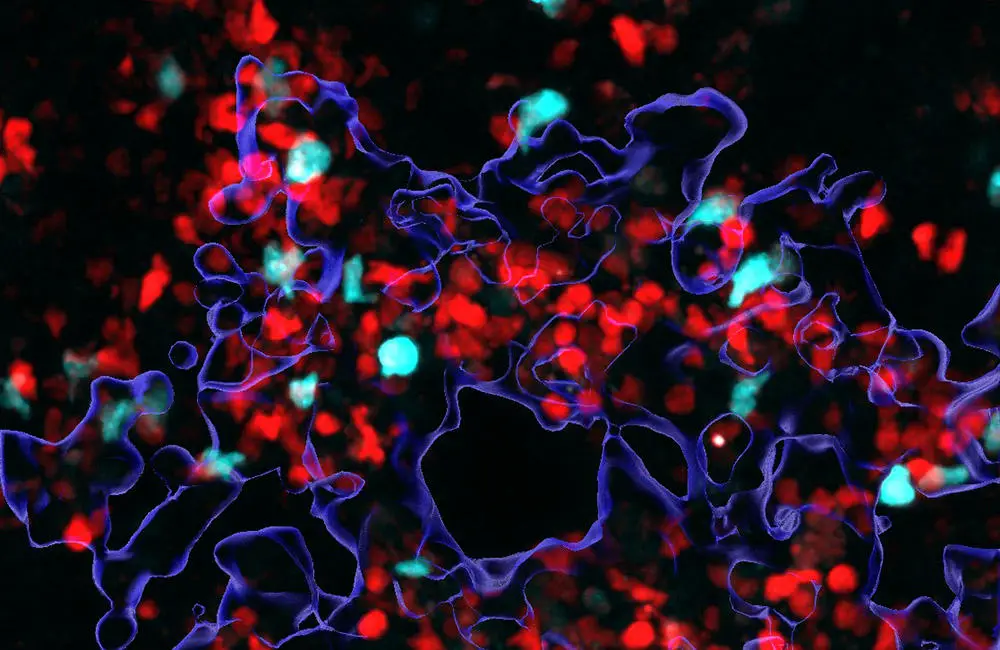A novel approach to bolstering the body’s defense against cancer has been unveiled by a collaborative team of scientists from Otto-von-Guericke University in Magdeburg. This breakthrough, featured in the journal Nature, centers on the crucial interaction between helper T cells and phagocytes, which is shown to play a pivotal role in fully activating the immune system’s cancer defense.
Modern cancer immunotherapies amplify the natural anticancer potential of killer T cells, which target and eliminate malignant cells. Unfortunately, some cancer cells evolve to evade detection by these T cells, rendering the treatment ineffective. The interdisciplinary Magdeburg researchers have illuminated a new mechanism that equips the immune system to combat such elusive cancer cells. This discovery could revolutionize cancer immunotherapies for the better.
Prof. Dr. Thomas Tüting, leader of the study and Professor of Dermatology at University Hospital Magdeburg, explains that the team focused on tackling “invisible” cancer cells that avoid killer T cells. In their investigation, they stumbled upon the unique capabilities of helper T cells.
Using a cancer model for experimentation, the scientists observed that a small contingent of helper T cells can be as successful in eradicating advanced cancers as a larger number of killer T cells. Strikingly, these helper T cells were also effective against cancer cells that had evaded detection by killer T cells.
Employing advanced microscopy techniques to observe immune cells in live cancer tissue, the researchers discovered that helper T cells behave differently from killer T cells. While killer T cells penetrate deep into cancer tissues and interact directly with cancer cells, helper T cells predominantly reside at the periphery of cancerous tissue, where they exchange signals with other immune cells.
A deeper investigation disclosed that helper T cells secrete chemical signals that attract immune system scavenger cells, prompting them to aid in destroying cancer cells. This collaboration mirrors their joint effort in combating bacterial and viral infections. This collaboration can potentially harness the full spectrum of immune defenses against cancer cells.
The mechanism underlying this interaction involves the release of inflammatory mediators by helper T cells, which work remotely to induce cancer cell death, akin to how the body combats pathogens. Although not yet fully comprehended, this mechanism presents promising avenues for enhancing cancer immunotherapies.
The research findings offer a strategy to utilize the immune system’s natural pathogen-fighting prowess to effectively eliminate cancer cells. Based on these insights, the Magdeburg researchers are in the process of devising novel approaches for cancer immunotherapy, particularly for patients whose cancers have become invisible to killer T cells.
The project involved collaboration with partners from universities in Würzburg, Cologne, Duisburg-Essen, Leuven (Belgium), Uppsala (Sweden), and the Helmholtz Centre for Infection Research in Braunschweig. Financial support came primarily from the German Research Foundation, the European Research Council, the German Cancer Aid, and the Else Kröner-Fresenius Foundation.
Table of Contents
Frequently Asked Questions (FAQs) about Immunotherapy Advancement
What is the main discovery of the research?
The research highlights a new mechanism involving helper T cells that can remotely induce the death of cancer cells, enhancing the potential of cancer immunotherapies.
How do modern immunotherapies work against cancer?
Modern immunotherapies activate killer T cells in the immune system to specifically target and eliminate cancer cells, but some cancer cells can evade detection, reducing treatment effectiveness.
What role do helper T cells play in this mechanism?
Helper T cells, typically found at the edges of cancer tissues, interact with other immune cells and release signals that attract scavenger cells, cooperating to destroy cancer cells remotely.
How do the findings impact cancer immunotherapy?
The study offers insights into using immune system functions to combat cancer, especially for patients with cancer cells that escape killer T cell detection, potentially improving treatment strategies.
What funding and collaborations were involved in the research?
The project saw collaboration with universities in Würzburg, Cologne, Duisburg-Essen, Leuven (Belgium), Uppsala (Sweden), and the Helmholtz Centre for Infection Research in Braunschweig. Financial support came from various sources including the German Research Foundation and the European Research Council.
More about Immunotherapy Advancement
- Nature Journal: CD4+ T cell-induced inflammatory cell death controls immune-evasive tumours
- Otto von Guericke University of Magdeburg
- German Research Foundation
- European Research Council
- German Cancer Aid
- Else Kröner-Fresenius Foundation


